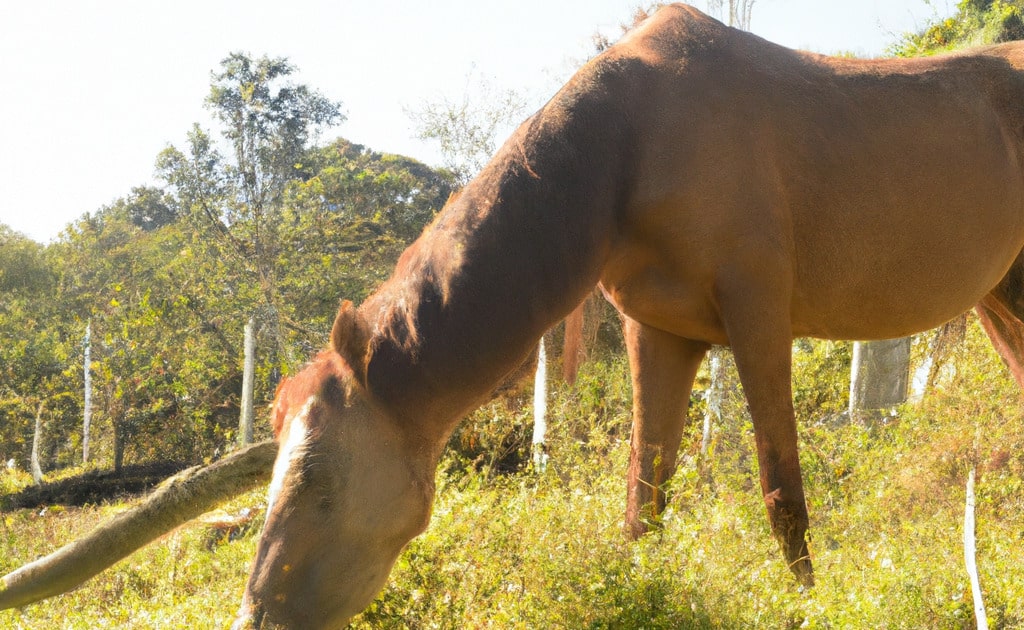Horses, majestic creatures embodying strength, grace, and beauty.
As equestrians, it is our duty to prioritize the well-being of our equine companions.
One often overlooked element that plays a crucial role in maintaining a horse’s overall health is magnesium.
Magnesium, a vital mineral, is involved in numerous physiological processes within a horse’s body.
From regulating muscle function to facilitating nerve transmission, magnesium is essential for the proper functioning of various bodily systems.
In this comprehensive article, we will delve into the importance of magnesium in horse health and explore the ways it can positively impact their overall well-being.
So, join us as we unlock the power of magnesium for your beloved equine friend.
The Importance of Magnesium in Horse Health
Magnesium is a vital mineral that plays a critical role in maintaining optimal health in horses. It is involved in a wide range of physiological processes, from muscle contraction and relaxation to nerve function and energy metabolism. Without adequate levels of magnesium, horses may experience various health issues and performance problems.
Muscle Function and Magnesium
One of the primary functions of magnesium is its role in muscle function. Magnesium is necessary for proper muscle contraction, ensuring that horses can move and perform various physical activities efficiently. It helps regulate the flow of calcium in and out of muscle cells, which is crucial for muscle relaxation after contraction. Insufficient magnesium levels can lead to muscle stiffness, cramps, and an increased risk of muscle injuries.
Nerve Transmission and Magnesium
In addition to muscle function, magnesium also plays a vital role in nerve transmission. It helps maintain the proper balance of electrolytes, including calcium and potassium, which are essential for nerve signaling. Magnesium deficiency can disrupt the normal transmission of nerve impulses, leading to issues such as nervousness, irritability, and even behavioral problems in horses.
Energy Metabolism and Magnesium
Furthermore, magnesium is involved in energy metabolism, particularly in the production and utilization of adenosine triphosphate (ATP), the primary energy currency of cells. It participates in enzymatic reactions that convert food into energy, ensuring that horses have the necessary fuel for physical activities and bodily functions. Insufficient magnesium levels can result in decreased energy levels, fatigue, and poor performance.
Immune System Support and Magnesium
Another critical aspect of magnesium in horse health is its involvement in maintaining a healthy immune system. Magnesium plays a role in the production and function of white blood cells, which are responsible for defending the body against infections and diseases. A deficiency in magnesium can weaken the immune response, making horses more susceptible to illnesses and infections.
Nutrient Absorption and Magnesium
Moreover, magnesium is essential for the proper absorption and utilization of other nutrients, including calcium and phosphorus. It helps regulate the balance of these minerals, ensuring that they are effectively absorbed and utilized by the body. Without sufficient magnesium, horses may experience imbalances in calcium and phosphorus levels, which can negatively impact bone health and overall well-being.
Factors Affecting Magnesium Requirements
It is important to note that magnesium requirements may vary depending on factors such as age, activity level, and overall health of the horse. While most horses can obtain adequate magnesium through a balanced diet, certain situations may increase the need for supplementation. These include intense exercise, stress, pregnancy, lactation, and certain medical conditions.
Next Steps: Dietary Sources and Supplementation
In the next part of this article, we will explore dietary sources of magnesium for horses and discuss the importance of proper supplementation to ensure optimal magnesium levels and promote overall horse health.

Dietary Sources of Magnesium for Horses
When it comes to ensuring optimal magnesium levels in horses, a balanced diet is key. There are several dietary sources that provide magnesium, allowing horses to meet their daily requirements naturally. Let’s explore some of the top dietary sources of magnesium for horses.
1. Pasture and Forage
One of the primary sources of magnesium for horses is pasture and forage. Fresh grass and hay contain varying levels of magnesium, depending on factors such as soil composition, plant variety, and maturity. Horses that have access to lush, green pastures can often obtain sufficient magnesium from grazing. However, it is important to note that the magnesium content in pasture can fluctuate throughout the year, so supplementation may be necessary during certain seasons or in areas with magnesium-deficient soils.
2. Magnesium-Rich Grains and Seeds
Certain grains and seeds are also rich in magnesium and can be included in a horse’s diet to boost their magnesium intake. Examples of magnesium-rich grains and seeds include flaxseed, sunflower seeds, pumpkin seeds, and sesame seeds. These can be incorporated into the horse’s feed in appropriate quantities to provide an additional source of magnesium.
3. Magnesium Supplements
In some cases, dietary sources alone may not provide sufficient magnesium to meet a horse’s requirements. This is especially true for horses with increased magnesium needs due to factors such as intense exercise, stress, or medical conditions. In such situations, magnesium supplements can be used to ensure optimal magnesium levels. There are various types of magnesium supplements available, including oral supplements, powders, and pellets. It is important to consult with a veterinarian or equine nutritionist to determine the appropriate dosage and form of supplementation for your horse.
4. Water Sources
Water can also contribute to a horse’s magnesium intake, although the amount of magnesium present in water sources can vary significantly. Some water sources, such as natural springs or well water, may contain higher levels of magnesium compared to tap water. However, it is important to note that relying solely on water as a source of magnesium may not be sufficient to meet a horse’s requirements, and a balanced diet with additional sources of magnesium should be provided.
5. Commercial Horse Feeds
Many commercial horse feeds and supplements are formulated to provide a balanced mix of nutrients, including magnesium. These feeds often contain a combination of grains, forage, and added vitamins and minerals to meet a horse’s nutritional needs. When selecting a commercial horse feed, it is essential to choose a reputable brand that provides detailed information about the nutrient content, including magnesium levels.
The Importance of Proper Supplementation
While dietary sources of magnesium are crucial, it is important to emphasize the significance of proper supplementation when necessary. As mentioned earlier, certain situations may increase a horse’s magnesium requirements, and relying solely on dietary sources may not be sufficient. Supplementing with magnesium can help ensure that horses receive the necessary levels of this essential mineral to support their overall health and well-being. However, it is crucial to consult with a veterinarian or equine nutritionist to determine the appropriate type, dosage, and duration of supplementation for your horse.
In the next part of this article, we will discuss the potential signs of magnesium deficiency in horses and explore the benefits of maintaining optimal magnesium levels for their overall health and performance.
Signs of Magnesium Deficiency in Horses
Magnesium deficiency can have a significant impact on a horse’s health and performance. It is crucial for horse owners and caretakers to be aware of the potential signs and symptoms of magnesium deficiency, as early detection and intervention can prevent further complications. Let’s explore some common signs of magnesium deficiency in horses.
1. Muscle Stiffness and Cramping
One of the most noticeable signs of magnesium deficiency in horses is muscle stiffness and cramping. Horses may exhibit difficulty in moving, reluctance to engage in physical activities, and a general lack of flexibility. They may also experience muscle spasms and twitching, particularly after exercise or during periods of stress. These symptoms can significantly impact a horse’s performance and overall well-being.
2. Nervousness and Irritability
Magnesium deficiency can also manifest as nervousness and irritability in horses. They may become easily startled, exhibit excessive spookiness, and display heightened sensitivity to their surroundings. Horses may also show signs of restlessness, such as pacing, pawing, and constant movement. These behavioral changes can affect their training, handling, and overall temperament.
3. Poor Performance and Lack of Energy
Insufficient magnesium levels can lead to poor performance and a lack of energy in horses. They may struggle to maintain stamina and endurance during physical activities, resulting in decreased athletic performance. Horses may appear lethargic, lack enthusiasm, and exhibit a general decline in their overall work ethic. This can be particularly concerning for competitive horses or those involved in demanding disciplines.
4. Abnormal Heart Rhythm
Magnesium plays a crucial role in maintaining a healthy heart rhythm in horses. A deficiency in magnesium can disrupt the electrical signals that regulate the heart’s contractions, leading to irregular heartbeats or arrhythmias. Horses with magnesium deficiency may exhibit symptoms such as an irregular pulse, palpitations, or a racing heart rate. It is essential to monitor heart health and seek veterinary attention if any abnormalities are observed.
5. Weak Immune System and Susceptibility to Infections
Another consequence of magnesium deficiency is a weakened immune system in horses. Magnesium is involved in the production and function of white blood cells, which play a crucial role in defending the body against infections and diseases. Horses with magnesium deficiency may be more susceptible to illnesses, infections, and slow healing of wounds. Maintaining optimal magnesium levels is essential for supporting a robust immune response.
The Benefits of Optimal Magnesium Levels
Maintaining optimal magnesium levels in horses offers numerous benefits for their overall health and performance. Adequate magnesium intake supports proper muscle function, allowing horses to move with ease and perform physical activities efficiently. It also promotes healthy nerve transmission, reducing the risk of behavioral issues and promoting a calm and focused demeanor. Optimal magnesium levels contribute to energy metabolism, ensuring horses have the necessary fuel for optimal performance and stamina. Additionally, magnesium plays a crucial role in supporting a strong immune system, helping horses ward off infections and stay healthy.
In Conclusion
Understanding the role of magnesium in horse health is crucial for horse owners and caretakers. Magnesium is a vital mineral that impacts various aspects of a horse’s well-being, from muscle function and nerve transmission to energy metabolism and immune system support. By ensuring horses receive adequate magnesium through a balanced diet and appropriate supplementation when necessary, we can help promote their overall health, performance, and longevity. Let’s prioritize magnesium and unlock its potential in supporting the optimal health of our equine companions.
In conclusion, magnesium plays a vital role in maintaining optimal health in horses. It is involved in a wide range of physiological processes, from muscle function and nerve transmission to energy metabolism and immune system support. By ensuring horses receive adequate magnesium through a balanced diet and appropriate supplementation when necessary, we can help promote their overall well-being and performance.
Proper magnesium levels contribute to improved muscle function, allowing horses to move with ease and perform physical activities efficiently. It also supports healthy nerve transmission, reducing the risk of behavioral issues and promoting a calm and focused demeanor. Additionally, optimal magnesium levels contribute to energy metabolism, ensuring horses have the necessary fuel for optimal performance and stamina. A strong immune system is also supported by maintaining adequate magnesium levels, helping horses ward off infections and stay healthy.
As responsible horse owners and caretakers, it is our duty to prioritize the well-being of our equine companions. Understanding the role of magnesium in horse health is crucial in providing them with the care they deserve. By being aware of the signs of magnesium deficiency and taking proactive measures to maintain optimal magnesium levels, we can help prevent health issues and promote the overall health and performance of our horses.
So, let’s make magnesium a priority in our horse’s diet and supplementation regimen. Consult with a veterinarian or equine nutritionist to determine the appropriate magnesium requirements for your horse based on factors such as age, activity level, and overall health. Ensure a balanced diet that includes magnesium-rich sources such as pasture, forage, grains, and seeds. And when necessary, consider appropriate magnesium supplementation to bridge any nutritional gaps.
By giving our horses the gift of optimal magnesium levels, we are investing in their long-term health, happiness, and performance. So, let’s unlock the power of magnesium and provide our equine companions with the support they need to thrive. Together, we can ensure that our horses lead healthy, fulfilling lives and continue to bring us joy and companionship for years to come.
Are you ready to prioritize magnesium for your horse’s health?


